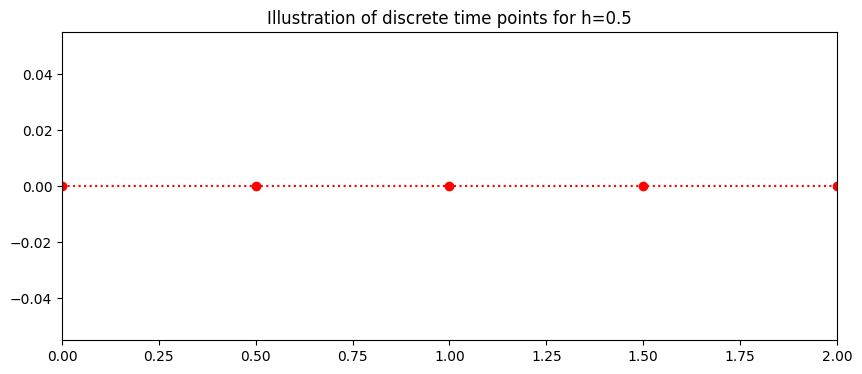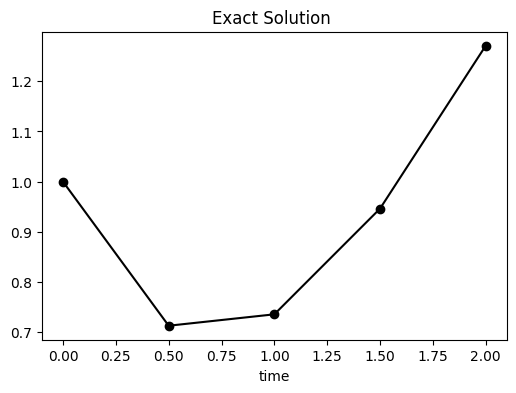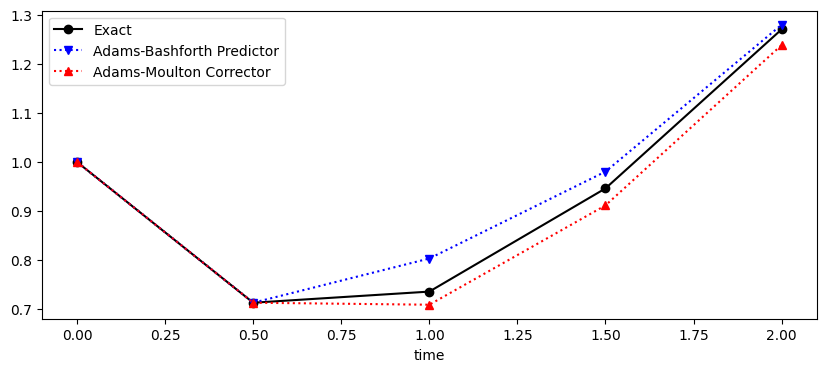Adams Predictor Corrector#
The Adams Predictor corrector method is used to side step the issue of the Adams-Moulton method being implicit. It can also be used to estimate error when the solution is unknown.
from IPython.display import HTML
HTML('<iframe width="560" height="315" src="https://www.youtube.com/embed/RsceVcOLAC4" frameborder="0" allow="accelerometer; autoplay; clipboard-write; encrypted-media; gyroscope; picture-in-picture" allowfullscreen></iframe>')
/Users/johnbutler/opt/anaconda3/lib/python3.8/site-packages/IPython/core/display.py:724: UserWarning: Consider using IPython.display.IFrame instead
warnings.warn("Consider using IPython.display.IFrame instead")
Intial Value Problem#
The differential equation
with the initial condition
will be used to illustrate the method.
Python Libraries#
import numpy as np
import math
import pandas as pd
%matplotlib inline
import matplotlib.pyplot as plt # side-stepping mpl backend
import matplotlib.gridspec as gridspec # subplots
import warnings
warnings.filterwarnings("ignore")
Defining the function#
\begin{equation} f(t,y)=t-y.$$
def myfun_ty(t,y):
return t-y
Discrete Interval#
Defining the step size \(h\) from the interval range \(a\leq t \leq b\) and number of steps \(N\)
This gives the discrete time steps,
where \(t0=a.\)
Here the interval is \(0≤t≤2\) and number of step 4
This gives the discrete time steps,
for \(i=0,1,⋯,4.\)
# Start and end of interval
b=2
a=0
# Step size
N=4
h=(b-a)/(N)
t=np.arange(a,b+h,h)
fig = plt.figure(figsize=(10,4))
plt.plot(t,0*t,'o:',color='red')
plt.xlim((0,2))
plt.title('Illustration of discrete time points for h=%s'%(h))
Text(0.5, 1.0, 'Illustration of discrete time points for h=0.5')

Exact Solution#
The initial value problem has the exact solution
The figure below plots the exact solution.
IC=1 # Intial condtion
y=(IC+1)*np.exp(-t)+t-1
fig = plt.figure(figsize=(6,4))
plt.plot(t,y,'o-',color='black')
plt.title('Exact Solution ')
plt.xlabel('time')
Text(0.5, 0, 'time')

# Initial Condition
w=np.zeros(N+1)
#np.zeros(N+1)
w[0]=IC
2-step Adams Bashforth (Predictor)#
The 2-step Adams Bashforth difference equation is
1-step Adams Moulton (Corrector)#
For \(i=0\) the system of difference equation is:
this is not solvable as \(w_{-1}\) is unknown.
For \(i=1\) the difference equation is:
this is not solvable as \(w_{1}\) is unknown. \(w_1\) can be approximated using a one step method. Here, as the exact solution is known, \begin{equation}w_1=2e^{-t_1}+t_1-1.$$
### Initial conditions
w=np.zeros(len(t))
w0=np.zeros(len(t))
w[0]=IC
w[1]=y[1]
w0[0]=IC
w0[1]=y[1]
Loop#
for k in range (1,N):
w0[k+1]=(w[k]+h/2.0*(3*myfun_ty(t[k],w[k])-myfun_ty(t[k-1],w[k-1])))
w[k+1]=(w[k]+h/2.0*(myfun_ty(t[k+1],w0[k+1])+myfun_ty(t[k],w[k])))
Plotting solution#
def plotting(t,w,w0,y):
fig = plt.figure(figsize=(10,4))
plt.plot(t,y, 'o-',color='black',label='Exact')
plt.plot(t,w0,'v:',color='blue',label='Adams-Bashforth Predictor')
plt.plot(t,w,'^:',color='red',label='Adams-Moulton Corrector')
plt.xlabel('time')
plt.legend()
plt.show
The plot below shows the exact solution (black) and the Adams Predictor Corrector approximation (red) of the intial value problem
plotting(t,w,w0,y)

Local Error#
The error for the 1 step Adams Moulton is:
where \(\eta \in [t_{n-1},t_{n+1}]\). The error for the 2 step Adams Bashforth is:
where \(\xi \in [t_{n-1},t_{n+1}]\).
Rearranging the equations gives
Making the assumption that
d = {'time t_i': t, 'Adams Predictor w0': w0,
'Adams Corrector':w,'Exact (y)':y,'|w-y|':np.round(np.abs(y-w),5),'|w0-w|':np.round(np.abs(w0-w),5),'estimate LTE':np.round(1/(6*h)*abs(w0-w),5)}
df = pd.DataFrame(data=d)
df
| time t_i | Adams Predictor w0 | Adams Corrector | Exact (y) | |w-y| | |w0-w| | estimate LTE | |
|---|---|---|---|---|---|---|---|
| 0 | 0.0 | 1.000000 | 1.000000 | 1.000000 | 0.00000 | 0.00000 | 0.00000 |
| 1 | 0.5 | 0.713061 | 0.713061 | 0.713061 | 0.00000 | 0.00000 | 0.00000 |
| 2 | 1.0 | 0.803265 | 0.708980 | 0.735759 | 0.02678 | 0.09429 | 0.03143 |
| 3 | 1.5 | 0.980510 | 0.911607 | 0.946260 | 0.03465 | 0.06890 | 0.02297 |
| 4 | 2.0 | 1.280147 | 1.238669 | 1.270671 | 0.03200 | 0.04148 | 0.01383 |
